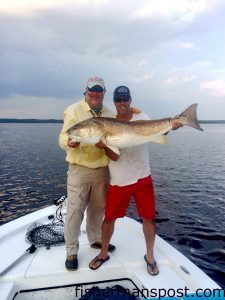Tidelines – August 14, 2014

tide_dubielCapt. Gary Dubiel, of Spec Fever Guide Service, helps Publisher Gary Hurley pose with his first citation red drum of the 2014 season. They were using DOA CAL jerkshads under DOA popping corks in a body of water near South River.
The end of summer (for me) is defined by my return to teaching responsibilities at Cape Fear Community College, and this back-to-school time of year comes with mixed emotions.
My mixed emotions aren’t that part of me yearns to return to the great rewards of making a difference in student lives and another part of me wants the summer vacation to go on forever. No, there’s no battle there—give me the endless summer.
My mixed emotions are that mid-August signals the woe of returning to the institutional world of black shoes and black belt and shaving every morning, but it also signals the return of great numbers of citation-class red drum to the Pamlico/Neuse area.
So when I was looking for a last hoorah before the start of committee meetings and syllabi preparations, my first look was to Capt. Gary Dubiel of Spec Fever Guide Service out of Oriental.
Dubiel innovated and popularized using popping corks during the day to target these big reds, and this past week was my second trip with him utilizing the technique. And like last year, the popping cork method gave me the satisfaction of hooking a big red on an artificial.
This year’s trip, though, was a little different than last year, and by different I mean harder.
Last year we had great weather, the fish had already been showing in strong numbers for weeks, and we were able to fish the waters he wanted to target and quickly produce more than enough fish for an article before returning to the docks for lunch.
This year Dubiel had to struggle more, but the popping corks ultimately produced.
There are certainly plenty of big red drum being caught already this year, but a number of factors have the fishery a little behind schedule, with the cold start to the year and the ridiculous amount of rain at the top of the list.
On our afternoon (we met at the dock around 3:00), as soon as we pulled under the Oriental Bridge the far side of the Neuse River was grayed out and threatening water spouts. The east wind had the water a little too churned up for popping corks on our side of the river, so we took a boat ride looking for signs of life: bait, birds, slicks, something.
And as our luck would have it that day, whether it was the wind or the recent runoff of rain water, no bait and no signs of fish were showing.
What the boat ride did do, though, was provide time for the weather to break enough for us to make it safely to some water near South River that Dubiel likes to target.
We pulled off plane, idled in, and quickly started fan casting his popping cork rigs—DOA CAL jerkbaits under beveled and weighted DOA popping corks.
Unlike last year when we were seeing nervous baitfish in the area before we started casting, this year we were blind casting. The theory for blind casting with popping corks is similar to the theory when bait fishing for big reds at night (when you also can’t see signs of fish)—you target waters known to regularly hold fish.
It wasn’t on my first couple of casts, and I can’t even say it was on my first 30-40 casts, but on our second pass through the body of water my popping cork rig finally came tight on the target species.
The fish ran me around the boat a couple of times and went on a couple of strong runs out to deeper water, but before long Capt. Gary Dubiel and I were posing with my first citation red drum of 2014.
Dubiel will be on these fish for months, including a couple of days where he will be shooting a show for George Poveromo’s World of Saltwater Fishing. I challenged you last year and now do it again—if you’ve never caught citation-class red drum on popping cork rigs, then give Dubiel a call and work it into your late summer/early fall schedule. Oriental is a relatively quick drive for most of us in North Carolina, but it’s also far enough away from that world where you have to tuck in your button down shirt.
